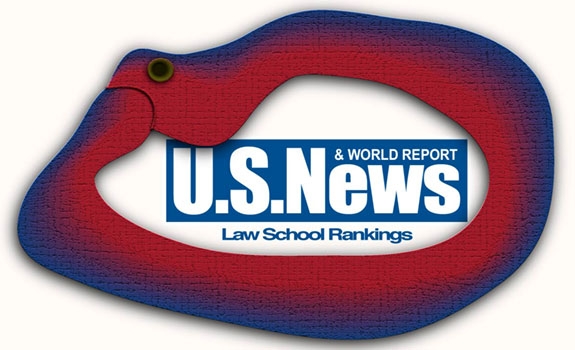
Our long national nightmare may soon be over.
The National Law Journal reported on Monday that SALT (not just a garden-variety spice, or a Strategic Arms Limitations Treaty, or an anagram of LSAT, but the Society of American Law Teachers) has recommended that law schools stop submitting LSAT information of incoming students to US News and World Report magazine (in a sense, “starving” the US News of information).
The US News Blog was not exactly quick to jump on this, posting today that the error law schools make in only going for high LSAT scores is confusing a median with an average (e.g. the law schools are just going for the highest average score, whereas, because US News reports the median score, schools could take low LSATs as long as they match them with high LSATs). That would be great if it made sense, but it still forces law schools to make the middle range of their scores higher and higher to rise up in the rankings. A median, although arguably more fair than a mean, takes the average of the middle terms, but that still requires that their is an even amount of scores above the median as there are below. So to get a median of 163, for example, half the class needs to be above that score, and half below. And if you want to rise in the rankings, that middle ground needs to be progressively made higher. So same problem, just a different statistical measure.
Basically, US News said, “it’s not our fault that law schools don’t understand math, and we don’t make these admissions decisions” and totally ignored the influence that their rankings actually have on admissions. Which is great.
Anyway, SALT’s recommendation is big news. First, SALT is not just some random blog clamoring for the end of the US News Rankings. It’s actually a decently sized organization of law school professors. Second, if schools actually do stop submitting LSAT date to US News and World Report, then that will have a profound effect on their ability to admit a more diverse body of students.
While the LSAT is commonly accepted to be the most accurate indicator of law school success, there is too much anecdotal evidence that the LSAT is simply a test of a student’s wealth. The ability of a student to afford a test preparation company, or afford to go to an excellent school, has a profound effect on how one will succeed on the LSAT. And I’d not like to live in a world where wealth is the biggest indicator of law school success (mostly because I feel that ability to read in dim light is probably, far and away, the biggest indicator of any law school success). If LSAT scores are no longer submitted, then the rankings will no longer be informed by them, then schools can feel free to admit a more well-rounded student body, then we will have a more diverse base of lawyers, and then the world as a whole will be a brighter, happier, more forgiving place.
Not to rehash everything we’ve written about the rankings, but they’re generally evil. Like Sauron evil. Or maybe even USC evil. And anything that changes or weakens those rankings should be cause for singing hosannas.
So we’ll keep this situation monitored, but it looks like at least someone out there is starting to make some noise.




